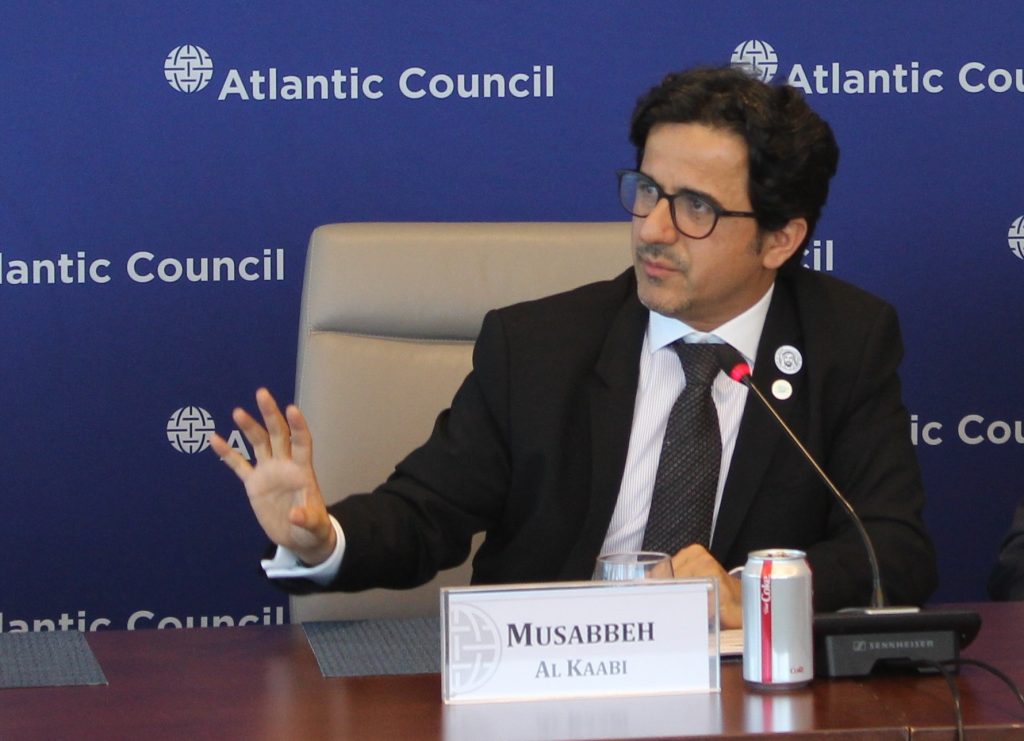Technology, policy, consumer preference, and price are driving dramatic changes in the energy mix, and the United Arab Emirates is at the forefront of efforts to innovate and diversify.
In an interview with Randolph Bell, director of the Atlantic Council Global Energy Center, Musabbeh Al Kaabi, chief executive officer for petroleum and petrochemicals at the UAE’s Mubadala discussed the future of oil demand, changes underway in the global energy market, and Mubadala’s forward-looking strategy for energy innovation.
Q: What is your view on the future of oil demand, and how do you manage uncertainty in oil demand?
Al Kaabi: The industry is putting more effort into understanding the outlook for oil demand, but the good news is that in recent years demand has been healthy and exceeding our expectations. As an investment company, we run different models looking forward. We try to do deep dives on the impact of EV’s and autonomous driving and the future demand for oil in view of these.
We came to two basic scenarios, one of them an aggressive scenario, and the other a conservative scenario. Each involves different levels of electric vehicle (EV) penetration and different government policies when it comes to climate change.
In the two scenarios, we see that oil demand going forward will remain healthy. And our conclusion is that oil will remain relevant in the future energy mix, regardless of which scenario you contemplate, and there is a long way to go before we see a significant impact on demand. We anticipate that only in 2040 will we see more pressure on oil demand globally, driven primarily by the electrification of the transportation sector.
Q: What are the various signposts you are looking for in terms of changes in oil demand? When you have your analysts out looking at the world, what do you have them looking at?
Al Kaabi: One key signpost is technology. We are monitoring the technological revolution and potentially disruptive technologies that will impact demand, again, especially in the transportation sector. The other key element is government policy. The government policies we have seen lately where various governments around the world are putting more restrictions on the internal combustion engine, and now they will go further with stricter regulations when it comes to the future of transportation.
We are keeping our eyes open for other signposts, but are fundamentally focused on these two: technology and government policy.
Q: Mubadala Petroleum and Petrochemicals is making a big investment in the petrochemical sector internationally. What is your rationale behind that set of investments?
Al Kaabi: In the petrochemicals space, you need to evaluate three key factors: the market, the competitiveness of the feedstock, and the cost structure of building a new facility.
We have done extensive analysis, and we like North America for one simple reason: It has very healthy and highly competitive feedstock, which puts the US and North America in general at a competitive advantage versus other regions of the world. Of course, the Middle East will remain very attractive. But gas prices there are being challenged by competition to feed the power sector and other industrial activities.
Overall, these two regions remain very attractive for petrochemicals—North America driven by the shale revolution and the Middle East, and particularly the Gulf Cooperation Council (GCC), driven by the abundance of resources.
Q: Where do you see the market for petrochemicals and plastics going?
Al Kaabi: We see very healthy demand growth globally, on average about four percent, especially polyethylene. We see increasing demand from Asia. In addition, we see this sector as an enabler for any future technological disruption, be it EV’s, autonomous driving, or even drones. There will be a higher demand for light materials, and light materials are plastics.
Q: What do you see Mubadala Petroleum and Petrochemicals’ role in the UAE’s overall diversification strategy?
Al Kaabi: We are very active, currently as a major investor globally, but also equally active in Abu Dhabi. Back in the 1990s, one of our subsidiaries, Borealis, built the foundation of the petrochemical industry in Abu Dhabi through the Borouge joint venture with Abu Dhabi National Oil Company (ADNOC). That company is a building block of the petrochemical sector in Abu Dhabi.
ADNOC is expanding in petrochemicals, and we are working closely with them to complement each other. As we speak, we are finalizing another project with Borouge, and we are also exploring an option to build a linear alkylbenzene plant in Abu Dhabi—the largest globally—to serve the regional market and the Asian market.
The petrochemical market, in particular, and the opportunity that Abu Dhabi offers to any investor, be it Mubadala or anyone else, is exciting; it is ideally situated to serve the rapidly growing Asian market.
Musabbeh Al Kaabi is chief executive officer for petroleum and petrochemicals at Mubadala. You can follow him on Twitter @mubadala and @mubadalauae
Image: Mr. Al Kaabi speaking at the Atlantic Council in 2018 (photo by the Global Energy Center).
